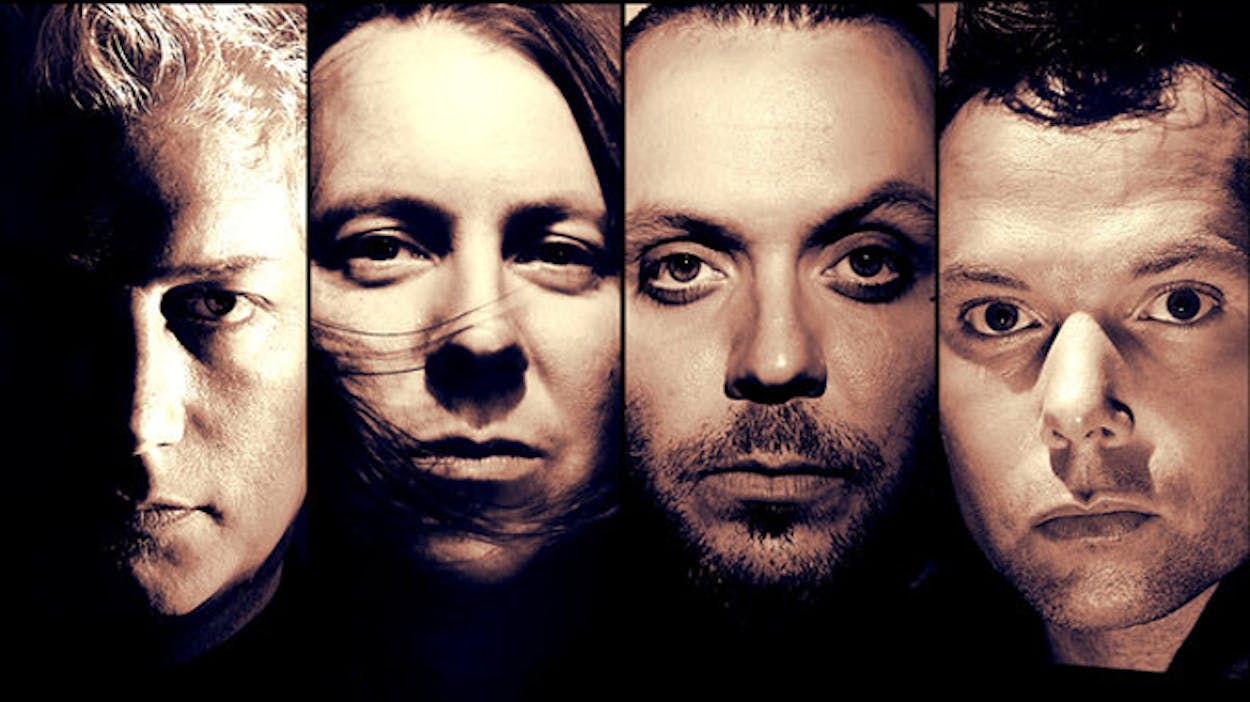In May of 2012, Justin Furstenfeld’s pregnant wife offered him an ultimatum: drinking and drugs or their marriage. The next day Furstenfeld’s bandmates in the platinum-selling rock band Blue October came to his house in San Marcos and presented him with a similar choice.
Their efforts worked. Furstenfeld checked into a Nashville rehabilitation center that same day to be treated for addiction to alcohol and prescription pills. He returned home 75 days later, in time to witness the birth of his daughter.
“I was an addict and a hypocrite,” Furstenfeld said in a recent interview. “I’d built a band and career telling everybody we’re a family, we got each other, we’re connected. And because of the drugs and alcohol, I bolted away from family, the band and our fans to destroy myself. I’m ashamed of that.”
Furstenfeld, 37, who formed Blue October in Houston in 1995 with his brother Jeremy and his high school friend Ryan Delahoussaye, speaks openly about his past. But the band’s new album, Sway (Up/Down Records), is less about the specifics of his recovery than it is about hope.
It’s a far cry from the band’s last record, Any Man in America (2011), a concept album chronicling his divorce and a bitter custody dispute with his first wife. Furstenfeld named names and flung accusations, creating what he regarded as a manifesto for the parental rights of fathers. But when the album failed to change his situation or anyone else’s, he grew frustrated, withdrew from touring, and turned to drugs and alcohol.
Any Man in America is laced with anger and self-pity, Furstenfeld said. “There’s a rock bottom for people’s lives, and there’s a rock bottom for music too,” he said. “I couldn’t have gone any lower. There’s a point where you hear someone whining so long you want to say, help yourself or shut up. This was that point.”
On Blue October’s earlier records Furstenfeld sang frequently about his struggle with bipolar disorder and being institutionalized in the 1990s, building a devoted following of fans who called themselves Blue Meanies.
In 2006, the band, which had lingered in the shadow of similar but more popular acts like Korn and the Deftones, finally moved beyond cult status with the breakthrough single “Hate Me,” a confessional song that opens with a voice mail message from Furstenfeld’s mother, checking in to make sure he has taken his medication. The single and its follow-up, “Into the Ocean,” were certified platinum, as was Foiled, the album on which they appeared.
But success didn’t make Furstenfeld feel better, and in 2009, on the eve of a tour intended to promote a suicide-prevention service, he was again institutionalized, after what was described as “an extreme mental anxiety attack.” Furstenfeld and his first wife divorced shortly after that, sparking the bitter custodial battle that is at the heart of Any Man in America. Furstenfeld now admits that during much of that battle he was in no shape to be a parent: after a short tour, he retreated to San Marcos and turned his home into a compound, leaving the house only to pick up drugs from the mailbox. Rehab last year gave him a new outlook.
“I realized the world is going to keep revolving whether I’m in it or not. It’s always been ‘me, me, me,’ and I’ve been blessed that people could find ways to relate to that,” said Furstenfeld, who partly financed the new album with pledges from fans. “It’s been honest work, but sometimes I think it was attention-seeking honesty. I was so focused on my struggle, shouting it out and seeing people react to it that I felt like I needed to stay in that pain.”
For Sway, a cleaned-up Furstenfeld dialed back the diarylike nature of his writing for something more universal. “No self-pity was rule No. 1,” he said. And indeed the album includes some of the most lyrically upbeat songs of his career, from the title track, a danceable meditation on living carefree, to “Angels in Everything,” a tribute to his wife that concludes with a vow to “live every moment like an angel flies.”
The theme of the record is gratefulness, but there is still plenty of bombast, like the expletive-filled “Light You Up,” in which Furstenfeld addresses a drug in the same way someone else might write a letter to a former lover, a variation on an exercise he had to do in rehab.
“My mother heard it and said, ‘I thought you got rid of the dark side,’” Furstenfeld said. “No. Now I just vent at the negative — the poison or people that get in the way of my peace. I’ve redirected my anger.”
Furstenfeld knows the stakes are high. He says he plans to avoid temptation on the road by traveling on a separate bus and attending Alcoholics Anonymous meetings daily.
“I can lay the demons out on a card table, call them by name and organize them into stacks,” Furstenfeld said. “But I’m not letting them run my life.”
- More About:
- Music






